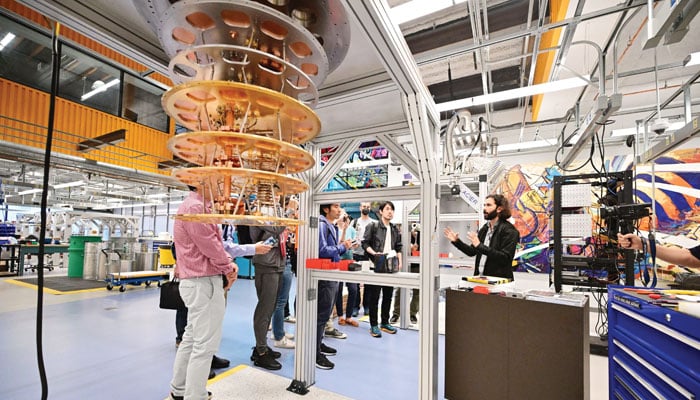
Huzaifa Ahmed
IBM has established the Quantum Volume benchmark to measure the performance of quantum computers. Quantum computer manufacturers used the term qubit to describe the overall performance of their computers. But the different architectures used to build computers make this comparison of quantum computer performance measurements unreliable. While Quantum Volume includes many performance elements.
For example: Coherence, scaling errors, interference, observer errors, frame fidelity, measurement fidelity, and initial fidelity can all be combined into one figure to form a quantum kit, which makes comparison easier. The private company’s unnamed quantum computer is based on the architecture of a quantum charged couples device, which is also described in a research paper titled Demonstration of QCCD trapped quantum. computer architecture) In this method, laser pulses are used by stopping ions in an electromagnetic field.
The company claims that this combination can detect far more common errors than many other qubit technologies that don’t use atoms directly. The company says its quantum computer has a quantum volume of 64. A year ago, ABM announced that its Q SystemOne quantum computer with a 20-qubit processor had a quantum volume of 16. This does not mean that quantum computers will continue to be as important to the general public and businesses as they are now. Is.
According to Ed Slinger, his 54-qubit computer can perform a specific calculation in 200 seconds, which would take 10,000 years to solve on a classical computer and 2.5 days on an IBM Adversarial Calculation. Quantum devices are still mainly used for academic research with government funding. A report by the US Academies of Sciences, Engineering and Medicine describes quantum computers.
For example: It is highly unlikely that a quantum computer will be able to perform 2048-RSA-bit encryption in the next decade. The most advanced quantum computer is expected to arrive soon. However, Tony Attelle, president of the company’s quantum solutions group, urged in an interview that the business community should start experimenting with the upcoming quantum computer to see how they can take advantage of it. and then train your workers for it. He further said that this is not a science project.
Rather, our goal is to add real value to the organizations we work with. A quantum computer could be useful for discovering new airways.

We have determined that we will increase the Quantum volume by upgrading its hardware every year over the next five years, as the company is keen to grow it in the market. A business group operating in the fields of aerospace, construction technologies, safety and manufacturing and metals technology. It has entered the quantum market by partnering with Microsoft and joined Azure Quantum a few years ago.
Following the introduction of the quantum computer by Venture Capital, the corporation’s computer business, the company has invested in software company Cambridge Quantum Computer and Zapata Computing, which will develop a computing platform that can perform chemistry, machine learning, cyber security, and more. Will correct. In addition, the company will develop quantum algorithms in collaboration with JP Moore Gunn and Chase in the business of finance, which will be useful in finance. Experts said that expertise in areas such as vacuum systems, magnetic field systems, lasers and phonics will be needed to create a quantum computer. need of
And these are all technologies that the private company has been engaged in for the past several years due to its aerospace and materials science business. A decade ago, the company realized that it had all the technology it would need to build a quantum computer, and has successfully passed several milestones. There is no special name. Perhaps that’s because it’s not something anyone will want to buy, as all such people will be able to get services through Microsoft Azure Quantum, which has yet to be priced.
Thomas Schenkel, interim director of the Applied Physics Accelerator Technology Division at Lawrence Berkeley National Laboratory, said that the more qubits work together, the more qubits will solve some types of problems faster than a classical computer, and the qubit Numbers aren’t everything. Things like gate fidelity (how accurately the work is done), mutual coherence (how long it takes for the calculation to reach a quantum state) and qubit coherence (the correlation between qubits) are very important.
It’s a very competitive race and there will be many winning technologies, because they will be developed to suit the specific problem. There’s a lot of discussion about how to move forward, Schenkel said. Like silicon-based Qbits, quantum dots or donor atoms, electron-based qubits are highly favored in the semiconductor industry due to their ease of fabrication and their shrinking and expanding properties.
But achieving this feature is very difficult. Now highly skilled people in semiconductor fabrication are coming into this industry, due to which it can be expected that great progress will be made in this industry. But Schenkel now finds the distortion of sounds and the presence of too many strings a challenge. These must be addressed, while the biggest challenge is correcting errors in thousands of qubits, which will be difficult to overcome quickly. For this, further investment in the industry is necessary in the future, the best results of which can be seen soon.
